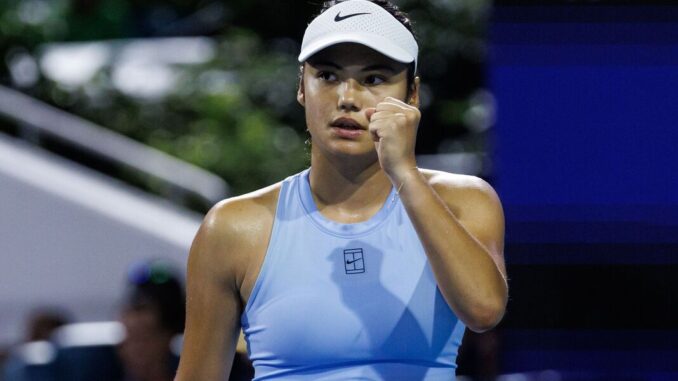
In the fast-paced world of professional tennis, where every decision can make or break a career, Emma Raducanu finds herself at a crossroads. The 22-year-old British sensation, who stunned the globe with her 2021 US Open triumph, has been navigating a turbulent journey since that fairy-tale victory. Recently, her approach to her career has drawn comparisons to an unlikely figure: Roman Abramovich, the Russian billionaire known for his ruthless, revolving-door management style during his tenure as Chelsea FC’s owner. As Raducanu continues to cycle through coaches with a frequency that echoes Abramovich’s infamous managerial purges, the question arises: is it time for her to embrace a “selfish” decision to secure her future in the sport?
Raducanu’s latest chapter unfolded in the wake of an impressive run at the Miami Open in March 2025, where she reached the quarter-finals—her deepest progression in a WTA 1000 event since her Grand Slam breakthrough. The tournament showcased her undeniable talent, as she toppled two top-20 players, including world No. 10 Emma Navarro, en route to a thrilling three-set clash with Jessica Pegula. Though she fell short against the American, 6-4, 6-7(3), 6-2, the performance signaled a resurgence, propelling her back into the top 50 of the WTA rankings for the first time since mid-2022. Yet, just as fans began to buzz with renewed optimism, Raducanu made a choice that raised eyebrows: she withdrew from Great Britain’s Billie Jean King Cup qualifiers, set to take place in mid-April 2025.
The decision to skip the prestigious team event wasn’t taken lightly. Raducanu’s team described it as a “difficult” call, emphasizing that the young star had been advised to prioritize her physical well-being. “Emma has been told to look after her body,” a statement from her camp explained, outlining plans for a two-to-three-week training block in lieu of national duty. The move sparked debate, with some applauding her focus on self-preservation and others questioning her commitment to Team GB. Anne Keothavong, the squad’s captain, acknowledged the complexity of the choice, noting, “I recognize it couldn’t have been an easy decision to make.” For Raducanu, however, the move reflects a growing awareness of the toll that constant competition—and the chaos of her coaching carousel—has taken on her still-developing career.
Much like Abramovich, who famously axed managers at the first sign of trouble, Raducanu has earned a reputation for her swift and decisive coaching changes. Since her US Open win, she’s parted ways with no fewer than seven coaches in under four years, a staggering turnover that has left observers both intrigued and exasperated. Her most recent split came with Vladimir Platenik, a respected Slovakian coach whose trial period lasted a mere 14 days before Raducanu deemed it wasn’t “heading in the right direction.” Platenik, gracious in defeat, praised her talent, saying, “Emma is super talented, and I hope she could take some of my advice for the future.” Yet, the brevity of their partnership underscored a pattern: Raducanu’s relentless pursuit of perfection often leaves little room for stability.
This Abramovich-esque approach has its merits—after all, Chelsea won plenty of silverware under his unpredictable reign—but it’s a high-stakes gamble for a tennis player whose career hinges on consistency. Raducanu’s Miami success came without a permanent coach, relying instead on familiar faces like LTA coach Colin Beecher and family friend Jane O’Donoghue. It was a makeshift setup that worked wonders, proving she can thrive under pressure. But as she eyes bigger prizes, including a return to Grand Slam contention, experts argue she needs to make a “selfish” choice: commit to a long-term coach and build a foundation for sustained success.
The parallels to Abramovich don’t end with personnel changes. Just as the oligarch wielded his wealth to reshape Chelsea, Raducanu holds immense potential to redefine British tennis—if she can harness it. Her Miami run was a reminder of her ceiling: a laser-like forehand, a crafty backhand slice, and a fearless competitive spirit. Yet, the physical and mental demands of the sport are unrelenting, as evidenced by a mid-match medical timeout in Miami, where dizziness forced her to regroup. Opting for a training camp over the Billie Jean King Cup could be the first step in a calculated pivot, one that priorit彼女izes her own trajectory over external expectations.
For Raducanu, the road ahead is fraught with challenges, but also opportunity. With one Major already in her trophy cabinet, her ambition stretches far beyond a single triumph. A period of stability—however “selfish” it may seem—could be the key to unlocking that potential. As she prepares for the clay season and a shot at Wimbledon glory, the tennis world watches with bated breath. Will she continue to emulate Abramovich’s cutthroat style, or will she carve a new path, one defined by patience and perseverance? Only time will tell, but one thing is certain: Emma Raducanu’s next move will be anything but predictable.
Leave a Reply